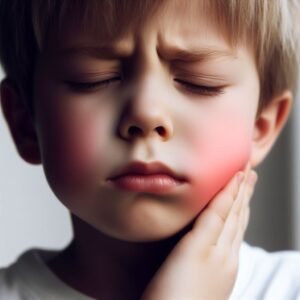Are you worried about your child’s jaw pain or difficulty opening their mouth? Do you hear clicking or popping sounds when they chew? They might be experiencing TMJ, a jaw joint disorder that can cause headaches and earaches too.
Keep an eye out for changes in their eating habits as well.
In this article, we’ll explore the signs of TMJ in children and provide helpful information to address this issue.
Key Takeaways
- Persistent jaw pain and limited jaw movement can indicate TMJ in a child.
- Clicking or popping sounds during jaw movement can be a common symptom of TMJ in a child.
- Recurring headaches and earaches, as well as changes in eating habits, can be signs of TMJ in a child.
- It is important to seek medical advice if a child experiences jaw pain or any of these TMJ symptoms persistently.

Jaw Pain
If your child experiences persistent jaw pain, it could be a sign of TMJ. TMJ, or temporomandibular joint disorder, affects the joint that connects the jawbone to the skull. This condition can cause discomfort and pain in the jaw area, making it difficult for your child to eat, speak, or even yawn comfortably.
The jaw pain associated with TMJ may vary in intensity, ranging from mild discomfort to severe throbbing pain. Your child may also experience difficulty in opening or closing their mouth fully.
It’s important to pay attention to this symptom and seek medical advice if the jaw pain persists. Early diagnosis and treatment can help alleviate the discomfort and prevent further complications associated with TMJ.
Difficulty Opening or Closing Mouth
You may notice difficulty opening or closing your child’s mouth if they’re experiencing TMJ. This can be a sign that their temporomandibular joint isn’t functioning properly.
Here are three things to look out for:
- Limited jaw movement: Your child may have trouble fully opening their mouth or may not be able to open it wide enough to eat or speak properly. They may also struggle to close their mouth completely, leading to difficulty in chewing or biting.
- Clicking or popping sounds: If you hear clicking or popping sounds when your child opens or closes their mouth, it could indicate a problem with their TMJ. This can be accompanied by pain or discomfort.
- Lockjaw: In severe cases, your child’s jaw may become locked in an open or closed position. This can be incredibly painful and may require immediate medical attention.
If you notice any of these symptoms, it’s important to consult a healthcare professional for an accurate diagnosis and appropriate treatment for your child’s TMJ.
Clicking or Popping Sounds
As you observe your child’s difficulty opening or closing their mouth, another indication of TMJ is the presence of clicking or popping sounds when their jaw moves. These sounds can be quite alarming, but they’re actually a common symptom of TMJ in children.
When the jaw joint is misaligned or the surrounding muscles are tense, it can cause the joint to move in an irregular manner, leading to clicking or popping sounds. These sounds may occur during jaw movements such as chewing, talking, or even yawning.
It’s important to note that while clicking or popping sounds can be a sign of TMJ, they may also occur in individuals without TMJ. If your child experiences these sounds along with other TMJ symptoms, it’s recommended to consult a healthcare professional for further evaluation.
Headaches or Earaches
Children with TMJ may experience headaches or earaches as a symptom of the condition. These discomforts can be quite bothersome and can impact a child’s daily activities. Here are three signs to watch out for:
- Recurring headaches: TMJ-related headaches are often described as a dull ache that affects the temples, forehead, or the back of the head. They can be accompanied by facial pain or jaw discomfort.
- Ear pain or earaches: TMJ can cause referred pain to the ears, leading to earaches or a feeling of fullness in the ears. Some children may also experience ringing or buzzing sounds in their ears.
- Jaw pain: TMJ-related jaw pain can be felt in the jaw joint or the surrounding muscles. It may worsen with chewing or jaw movements and can sometimes radiate to the face or neck.
If your child is experiencing any of these symptoms, it’s important to consult a healthcare professional for a proper diagnosis and appropriate treatment.
Changes in Eating Habits
If your child is experiencing TMJ, they may exhibit changes in their eating habits. TMJ, or temporomandibular joint disorder, can cause discomfort and pain in the jaw joint and surrounding muscles. As a result, your child may have difficulty opening their mouth wide or chewing certain foods. They may also experience pain while eating or avoid certain foods altogether.
Additionally, TMJ can cause muscle fatigue, making it tiresome for your child to eat for extended periods. You may notice that your child takes longer to finish their meals or becomes more selective in their food choices.
These changes in eating habits can be a sign that your child is experiencing TMJ and should be further evaluated by a healthcare professional.
Conclusion
If your child is experiencing jaw pain, difficulty opening or closing their mouth, clicking or popping sounds, headaches or earaches, or changes in eating habits, they may be showing signs of TMJ.
It’s important to take these symptoms seriously and consult a healthcare professional for a proper diagnosis and treatment plan.
Early detection and intervention can help alleviate the discomfort and prevent further complications in your child’s oral health.

Mr. Mark Rogers is independent health investigator with over 25+ years of experience. He’s also a father and past TMJ sufferer. He’s explored numerous treatment options and found the most lasting relief from Neuromuscular Release Therapy. His passions include biohacking, cycling, and spending time with his family. He’s based out of beautiful Atlanta, Georgia. You can find him on his social profiles below.